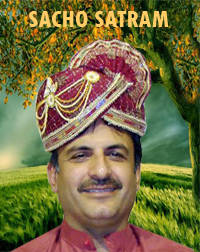Hazir Swaroop Sai Sadhram Saheb, in his sacred Satsang, imparted wisdom to the children of Gurukul, at Sacho Satram Tirath Dham, emphasizing the importance of values and righteousness in life. He explained that values are inherent in us from birth, yet as we grow older, we often drift away from them.
To illustrate this, he invited a few children one by one and asked them simple yet profound questions.
First, he asked a child, “Do you feel happier when your mother scolds you or when she loves you?” The child replied, “Both make me feel good.” Pleased with the answer, Sai Jan asked another question: “When you cry, does your mother feel happy, or is she happy when you laugh?” The child innocently responded, “My mother is happy when I laugh.”
Then, he turned to another child and asked, “Is smoking good or bad?” The child confidently answered, “Smoking is bad.”
Next, Saijan asked a little girl, “Do you prefer eating food or eating grass?” The girl promptly replied, “Eating food is good.”
After listening to their responses, Saijan explained that even at a young age, children naturally know what is right and wrong. This understanding is not something external—it is an innate wisdom granted by God.
Saijan further elaborated that we have attained this human birth after passing through countless life forms. In our past lives, we may have been animals, birds, aquatic creatures, trees, or plants, and we lived according to the nature of that form. But now, in this human life, God has given us the precious gift of wisdom—the ability to distinguish between right and wrong.
He emphasized that as we grow older, we must not let this wisdom fade. When children are asked questions about good and bad, they answer with clarity, even though they have not experienced much of life. This proves that we are born with a natural sense of righteousness. However, as people grow older, they sometimes ignore this inner wisdom and allow distractions and negative influences to take over.
Hazir Swaroop Sai Sadhram Saheb highlighted that the very purpose of a Gurukul or Sanskar School is to remind us of our inherent values and help us apply them in our daily lives.
He posed a thought-provoking question:
“When we know that smiling is good, why do we spoil our mood? Shouldn’t our smiles increase as we grow older?”
Saijan explained that the more we focus on goodness, the more it becomes ingrained in our subconscious mind. When we gain wealth and power, if we retain our good values, we will use them wisely, ensuring that happiness and peace prevail in our homes.
Saijan lovingly advised the students that since they already know right from wrong, they should never adopt bad habits. Furthermore, if they see their elders engaging in any wrongdoing, they should gently guide them toward the right path. For example, if fighting is not good, why should we fight? If this wisdom is followed, negativity will disappear from our homes, and happiness will always remain.
He reiterated that values are not something we acquire later in life; they are present within us from birth. However, as we grow, we often move away from them. This is why a Gurukul is not just for children—it is for adults as well.
Children naturally understand that smoking is harmful, that smiling is better than anger, that love is preferable to fighting, and that eating food is better than eating grass. If we already know these things, then why should we not live accordingly?
The question then arises: How do we strengthen these values?
The answer, Sai Jan explained, is simple—by nurturing them, practicing them, and never allowing them to fade. That is why Gurukuls exist—to reinforce these virtues so that children grow up with a strong foundation in righteousness.
He also pointed out that children learn more from what they see than from what they are told. If elders smile, children will naturally smile too. If elders avoid bad habits, children will never pick them up. However, if elders do wrong and then instruct children not to follow, their words lose their power. Instead, children will ask, “If you do it, why are you stopping us?”
Children’s words carry great purity because they speak with sincerity. Saijan emphasized that the true role of a Gurukul is to preserve and nurture these good values so that they remain strong throughout life.
He reminded everyone that as we grow, we must not lose the goodness we were born with. If children stray from the right path, it is not their fault—it is the responsibility of the elders who guide them. If elders live righteously, children will naturally follow.
Hazir Swaroop Sai Sadhram Saheb concluded by saying that God has already instilled good values within us. The role of education, especially in a Gurukul, is to ensure that these values remain with us throughout life. Through this, we build a life of purity, righteousness, and strength.
He then blessed all the teachers for their sincere efforts in nurturing the students and guiding them toward the right knowledge. He also blessed the students, wishing them a life filled with virtues, success, and honor.



